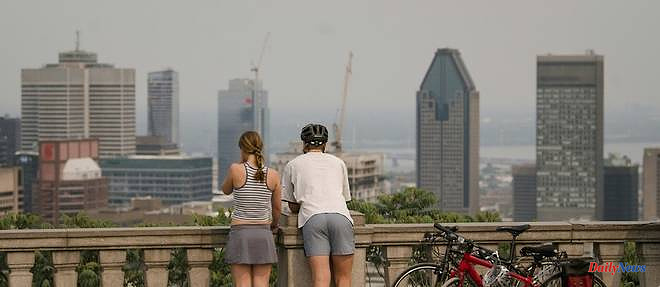About 160 fires are still active Tuesday in Quebec, which has become the epicenter of a catastrophic spring on the fire front in Canada, causing a deterioration in air quality across borders.
Most of these fires (about 110) in the province of 8 million people are considered out of control.
In the region of Sept-Iles, near the Saint Lawrence River in northern Quebec, 10 to 20 mm of rain expected during the day should help firefighters while 4,400 Quebecers were able to return home.
"We are very, very happy to see the rain," said provincial premier François Legault.
There is also, further north, "a huge fire which will take weeks to extinguish completely so we must remain cautious", he underlined.
In the Abitibi-Témiscamingue region, the most affected, more than 650 km north of Montreal, a fire continues to be considered "worrying" even if it slows down, added Mr. Legault.
"We are experiencing a situation never seen, if not out of the ordinary, everywhere in Quebec", warned François Bonnardel, Minister of Public Security, stressing that a large part of these fires are "of human cause". "Usually, the West is burning, Quebec is not burning (...) but there, it is burning everywhere," he pointed out.
Dozens of fires are still active in the west of the country, hit in early May, particularly in Alberta (62 fires) and British Columbia (76), but also in the center, in the province of Saskatchewan (24 ).
The French-speaking province has recorded 424 fires since the start of the year, compared to an average of 200 on the same date over the past ten years.
A hundred French firefighters are to arrive as reinforcements by Friday.
Canada, which, due to its geographical location, is warming faster than the rest of the planet, has been confronted in recent years with extreme weather events whose intensity and frequency have been increased by climate change.
Pushed by the winds, the smoke from the fires that affect the east of the country has reached Montreal and especially the capital Ottawa, where the poor air quality presents a "very high risk" for the population, according to Environment Canada.
Ottawa officials urged residents to avoid outdoor physical activity and said the situation is expected to continue for the rest of the week.
"The smell of smoke is very strong... A few people wear masks in the streets, you have to close doors and windows to prevent your home from smelling like an ashtray," he told AFP Abe Bourgi, resident of the Canadian capital.
The orange veil enveloping several major Canadian cities has spread over hundreds of kilometers, crossing the border with the United States and in particular as far as New York.
The famous "skyline" of Manhattan was thus difficult to observe on Monday, with an equally poor air quality.
06/06/2023 21:25:33 - Montréal (AFP) - © 2023 AFP












